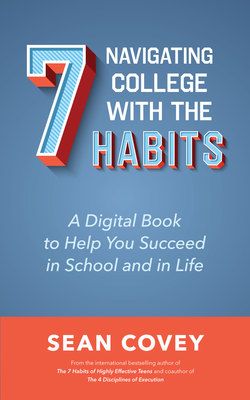Читать книгу Navigating College With the 7 Habits - Sean Covey - Страница 7
На сайте Литреса книга снята с продажи.
ОглавлениеHabit 1 is to Be Proactive.
To be proactive is to take charge of your life. You take charge of your education. You choose your classes, your major, and your career. You choose when to wake up and when to go to sleep. You choose your friends and how you will spend your time. You face the obstacles and beat them. You are captain of your own ship, general of your own army, mayor of your own town, and president of You, Inc.
The opposite of proactive is reactive. If you’re a reactive student, you avoid responsibility for your life and your education. You blame other people. You say, “I would have aced that test, but my roommate wouldn’t lend me his notes.” Or you blame circumstances for your problems: “It was too cold to go to class.” You act like a victim: “That professor’s out to get me.” You need somebody else to do everything for you: “Mom, would you take the bus over here and do my laundry for me? I know it’s two hundred miles, Mom…”
In this chapter, we’ll find out how proactive you are and what you can do to become more so.
If you practice Habit 1, you see yourself as free to choose and your future as the product of your own choices, no one else’s. So, you take responsibility for your own life and take the initiative to get the future you want.
Imagine being in a situation where you’re completely helpless—where other people totally control you. In this situation, these people hate you and want to make you suffer. The Jewish psychiatrist Viktor Frankl was in a situation like this when he was imprisoned in a Nazi concentration camp during World War II. In his famous book Man’s Search for Meaning, written after the war, he describes many atrocities, including watching his parents, brother, and wife be sent off to die in gas chambers. Only he and a sister survived.
As a medical student, Frankl had been schooled in determinism, a theory about why people behave as they do. Determinism suggests that you are who you are because of your genes or your environment, allowing people to blame their bad habits on their genes. “My grandfather was hot-tempered, so my dad was that way, too, and now so am I. There’s nothing I can do about it.” Or else your environment makes you who you are—your home life, your neighborhood, your friends, your school, the economy. This is the paradigm of determinism.
Clearly, your genes and environment both play a role in who you are. But Frankl saw things in the prison camps that he couldn’t explain with the theory of Determinism. He said, “We who have lived in concentration camps can remember the men who walked through the huts comforting others, giving away their last piece of bread. They may have been few in number, but they offer sufficient proof that everything can be taken from man but one thing: the last of the human freedoms—to choose one’s attitude in any given set of circumstances—to choose one’s own way.”
Frankl discovered that people are free to choose their own responses to life’s circumstances. This discovery excited him. It meant that his captors could jail him, kill his family, and torture his body, but only he could choose how to respond to it all. They could not take that choice from him. Only he—neither his genes nor his environment—could choose what he would do.
Fortunately, Frankl survived the war. Afterwards, he taught his students about their freedom to choose their own responses to life. His message: You are not simply a product of your genes and your upbringing. You are a product of your own choices. You’re free to choose what you will do about what happens to you.
